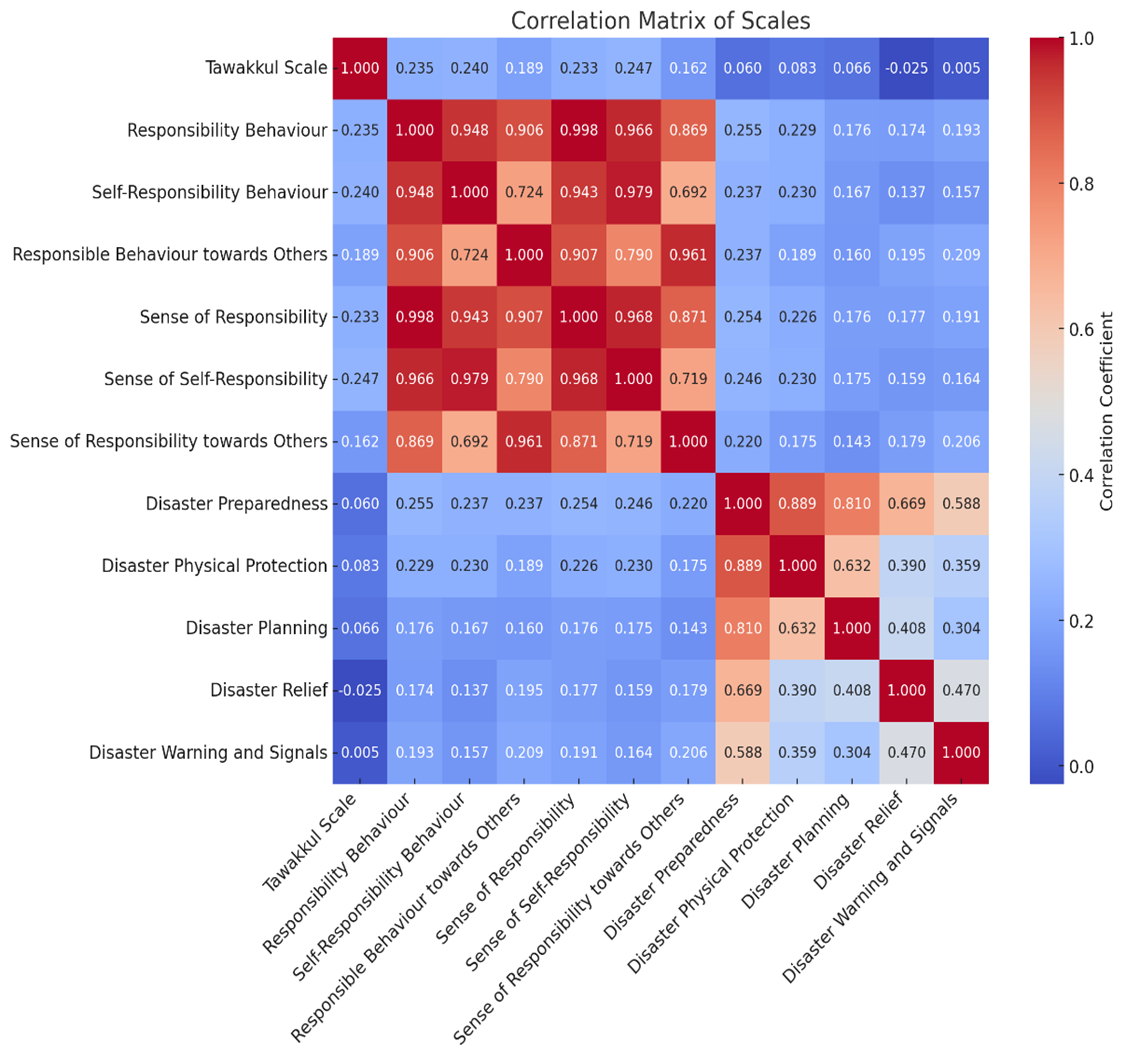Measuring the Impact of Understanding Precaution and Trust (Tawakkul) in the Face of Natural Disasters on the Consciousness of Responsibility: The Case of Türkiye
Abstract
 Abstract Views: 0
Abstract Views: 0
This study aims to explore how the concepts of precaution, reliance on Allah (tawakkul), and a sense of responsibility, as understood in Islamic belief, are reflected in individuals’ lives when faced with natural disasters. The study, conducted using a scale with individuals from various regions of Türkiye who have experienced earthquakes, seeks to determine the impact of these concepts on their sense of responsibility. A quantitative method was used to assess how precaution and tawakkul influence the sense of responsibility during natural disasters. Data were collected from 405 participants using the Responsibility Sense and Behavior Scale, Disaster Preparedness Scale and Reliance on Allah (Tawakkul) Scale, which included 53 questions. Participants were also asked about their experiences with natural disasters to analyze their attitudes toward precaution, tawakkul, and responsibility. The results show that while individuals in Türkiye demonstrate high levels of tawakkul—entrusting outcomes to Allah after fulfilling their responsibilities—their disaster preparedness and precautionary measures remain low, regardless of personal experience with disasters. This study is one of the first to empirically examine the intersection of Islamic concepts and disaster preparedness. It contributes to the literature by evaluating whether reliance on Allah enhances or hinders disaster readiness. The findings highlight the need for educational initiatives that align religious teachings with risk mitigation strategies.
Downloads
References
Abū al-Ḥasan ʿAlī b. Muḥammad, Sayyid Sharīf al-Jurjānī. Al-Taʿrīfāt. Beirut: Dār al-Kutub al-ʿIlmiyya, 1983.
Akarsu, Bedia. Dictionary of Philosophical Terms. Ankara: Turkish Language Association Publications, 1975.
Avdar, Ramazan, and Reyhan Avdar. “Macroeconomic, Social, and Environmental Impacts of the February 6 Earthquakes on the Turkish Economy.” Journal of Academic Approaches 5, no. 1 (June 20, 2022): 1–12. https://doi.org/10.35341/afet.1032084.
Bukhārī, Muhammad b. Ismāʿīl al-. Sahîh Al-Bukhârî. Beirut: Dār al-Kotob al-Ilmiyah, 2014.
Değirmenci, Yavuz., and İlhan İlter. “The Natural Disasters in the Geography Teaching Curriculum.” Marmara Coğrafya Dergisi, no. 28 (2013): 276–303.
Erkan, E. Ayşe. Risk Reduction in Disaster Management and Problems Encountered in Turkey. Ankara: Devlet Planlama Teşkilatı, 2010.
Gondal, Muhammad Usama., Adnan Adil, and Anam Khan. “Tawakkul Mediates Between Personality Traits, Depression, and Anxiety in Pakistani Muslim Adults.” Journal of Religion and Health 63, no. 1 (February 1, 2024): 582–94. https://doi.org/10.1007/s10943-023-01771-1.
—., Adnan Adil, Sultan Shujja, and Anam Yousaf. “Mediating Role of Tawakkul Between Religious Orientation and Stress Among Muslim Adults.” Mental Health, Religion & Culture, March 16, 2023. https://www.tandfonline.com/doi/abs/10.1080/13674676.2023.2226600.
—., Adnan Adil, Ghulam Yasin, and Sultan Shujja. “Development and Validation of Tawakkul Scale for Muslim Adults in Pakistan.” Journal of Religion and Health 61, no. 4 (August 1, 2022): 3470–91. https://doi.org/10.1007/s10943-021-01449-6.
Gümrükçüoğlu, Süleyman. “Basic Qur’ānic Concepts for Religious Education in Dealing with Natural Disaster.” Turkish Journal of Religious Education Studies, no. 16 (December 30, 2023): 79–109. https://doi.org/10.53112/tudear.1331610.
Huda, Miftachul., Ajat Sudrajat, Razaleigh Muhamat, Kamarul Shukri Mat Teh, and Burhanuddin Jalal. “Strengthening Divine Values for Self-Regulation in Religiosity: Insights from Tawakkul (Trust in God).” International Journal of Ethics and Systems 35, no. 3 (June 12, 2019): 323–44. https://doi.org/10.1108/IJOES-02-2018-0025.
Kahraman, Fikret. “Earthquake and Responsibility Awareness in the Context of Tawakkul and Destiny.” Diyanet Academic Journal 56 (2020): 903–36.
Karataş, Kasım., and Mustafa Baloğlu. “The Psychological Reflections of Tawakkul.” Çukurova University Faculty of Theology Journal 19, no. 1 (June 26, 2019): 110–18. https://doi.org/10.30627/cuilah.545806.
Körükcü, Saliha. “Example Understanding of Respect of the Prophets in the Qur'ān.” Nisar, no. 1 (2022): 65–99.
Lewisohn, L. “Tawakkul.” In Encyclopaedia of Islam New Edition Online (EI-2 English). Brill. Accessed February 10, 2025. https://doi.org/10.1163/1573-3912_islam_SIM_7447.
Özen, Yener. “Development, Reliability, and Validity of the Responsibility Feeling and Behavior Scale.” Gümüşhane University Journal of Social Sciences Electronic, no. 7 (2013). https://dergipark.org.tr/tr/pub/gumus/issue/7516/99066.
Sabırsız, Ebru., and Mesut Şöhret. “Macroeconomic, Social, and Environmental Impacts of the February 6 Earthquakes on the Turkish Economy.” Journal of Academic Approaches. (January 4, 2024). https://doi.org/10.54688/ayd.1390984.
Sachedina, Abdulaziz. “Introduction.” In Islamic Ethics: Fundamental Aspects of Human Conduct, edited by Abdulaziz Sachedina, 0. Oxford University Press, 2022. https://doi.org/10.1093/oso/9780197581810.003.0001.
Şahin, Meryem. “Development of Tawakkul Orientation Scale: A Study of Validity and Reliablity.” Journal of Values Education 18, no. 40 (December 25, 2020): 345–69. https://doi.org/10.34234/ded.768176.
Salata, Stefano., and Taygun Uzelli. “The Uncertain Certainty of a Nightmare: What If Another Destructive Earthquake Strikes Izmir (Türkiye)?” Sustainability 16, no. 2 (January 2024): 635. https://doi.org/10.3390/su16020635.
Şentuna, Barış., and Fahri Çakı. “A Scale Development Study in the Balıkesir Sample: Disaster Preparedness Scale.” İdiealkent 11, no. 31 (December 31, 2020): 1959–83. https://doi.org/10.31198/idealkent.728896.
Tirmidhī, Abū Isā Muhammad ibn Isā. Sunan Al-Tirmidhī. Beirut: Mü’assasat al-Risālah, 2013.
Walika, Miran., Maria Moitinho De Almeida, Rafael Castro Delgado, and Pedro Arcos González. “Outbreaks Following Natural Disasters: A Review of the Literature.” Disaster Medicine and Public Health Preparedness 17 (2023): e444. https://doi.org/10.1017/dmp.2023.96.
Zafer, Hakan. “Tawakkul Scale (TÖ): Validity and Reliability Study – Summary.” 2016.

Copyright (c) 2025 Hüseyin Okur, Melek Çelik İnce, Ali Cançelik

This work is licensed under a Creative Commons Attribution 4.0 International License.

This work is licensed under a Creative Commons Attribution 4.0 International License. Authors retain copyright and grant the journal right of first publication with the work simultaneously licensed under a Creative Commons Attribution (CC-BY) 4.0 License that allows others to share the work with an acknowledgement of the work’s authorship and initial publication in this journal.







